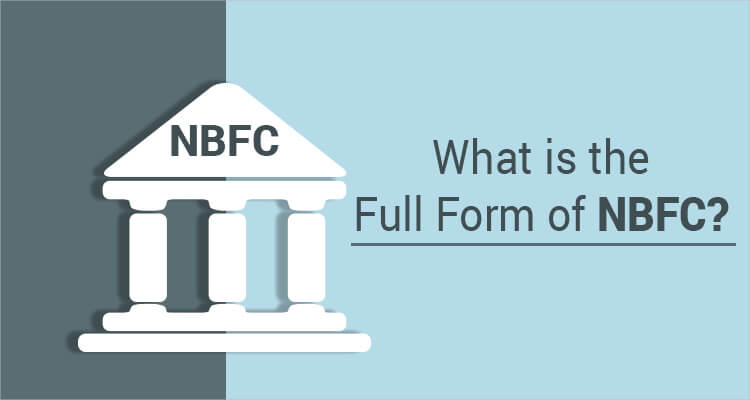What Is The Full Form Of NBFC?
Table of Contents
If you find yourself searching NBFC full form, non banking financial institutions, NBFC bank, what is NBFC, NBFC meaning, difference between NBFC and bank, or NBFC companies then you have landed on the correct page. Non-banking financial companies (NBFCs) are financial institutions that offer various banking services but do not have a banking license. They are registered under the Companies Act and regulated by the Reserve Bank of India (RBI). NBFCs play a vital role in the Indian financial system by providing credit and financial inclusion to the underserved segments of society.
NBFCs in India have become prominent due to easy credit, their pan-India presence, superior customer service, and their use of digital technology. But what is an NBFC? What’s the purpose of such institutions? Learn NBFC’s meaning and more in this article.
NBFC Full Form
An NBFC is a Non-Banking Financial Company without a full banking license that provides financial services and products. General, these institutions cannot accept traditional demand deposits from the public, such as checks or savings accounts.
An NBFC is also called an NBFI, a non-banking financial institution.
History Of NBFC
NBFCs were founded in India in the 1960s to cater to the financial needs of individuals not adequately served by banks. It took a long time for Non-Banking Financial Companies to impact the financial industry because they were initially small organisations. The RBI amended its Act 1934 in December 1964 to include a new chapter dealing with NBFCs. As a result of this act, NBFCs could appropriately establish themselves in India.
Later, two committees were established by the Indian government to review NBFC structures and operations: James S Raj Committee, the 1970s and the Chakravarty Committee, 1982.
NBFCs have expanded significantly over the past few decades in terms of their operations, range of products and services, and technological advancements, among other things.
Examples of NBFC in India
Here are some NBFC you must have heard of:
- Bajaj Finance Limited: One of the largest and most diversified NBFCs in India, offering consumer loans, business loans, wealth management, insurance, and digital payment solutions.
- Muthoot Finance Limited: The largest gold loan NBFC in India, offering loans against gold ornaments and jewellery, as well as other financial services such as money transfer, insurance, and mutual funds.
- IIFL Finance Limited: It is a prominent NBFC that provides loans for gold, business, personal, home, and property purposes, as well as wealth and asset management, broking, financial product distribution, and investment banking services.
What Are The Services Offered By NBFCs?
Services offered by NBFCs include:
• Credit and loan facilities
• Acquisitions and mergers advice
• Underwriting shares
• Hire-purchase
• Leasing
Different Types of NBFCs
There are types of NBFCs, and they can be classified into different types based on their nature of activities, sources of funds, and regulatory framework. Some of the common types of NBFCs are:
- Asset Finance Company (AFC): It is an NBFC that finances the acquisition of physical assets such as vehicles, machinery, equipment, etc.
- Investment Company (IC): These NBFCs deal with the acquisition of securities such as shares, bonds, debentures, etc.
- Loan Company (LC): As the name suggests, these NBFCs provide loans for personal or business purposes, such as consumer loans, SME loans, etc.
- Infrastructure Finance Company (IFC): If you need loans for infrastructure projects such as roads, bridges, power plants, etc. then these are the NBFCs that can help you.
- Micro-Finance Company (MFC): It is an NBFC that provides small loans to low-income individuals and groups, mainly for income-generating activities.
- Housing Finance Company (HFC): Financing for housing and real estate purposes, such as home loans, mortgage loans, etc. can be a nightmare. That’s where HFCs come in as a saviour.
- Core Investment Company (CIC): It is an NBFC that holds not less than 90% of its net assets in the form of investment in equity shares, preference shares, bonds, debentures, or loans in group companies.
- Mortgage Guarantee Company (MGC): an NBFC that provides guarantee for repayment of loans secured by mortgage of residential property.
Role And Objectives Of NBFC
Roles Of NBFCs
1. As NBFCs provide tailored solutions to diverse customer needs, they contribute to inclusive growth in the country.
2. A large portion of new businesses' funds come from NBFC Business Loans.
3. As NBFCs provide loans to Micro, Small, and Medium Businesses, contributing to building financial strength.
4. NBFCs play a significant role in the country's overall development by creating jobs, developing transportation, generating wealth, etc.
Objectives Of NBFCs
1. Several NBFCs create jobs in the country by lending loans to private companies, which causes a rise in demand.
2. NBFCs facilitate the distribution of funds, which leads to income regulation, thus influencing the economic development of a nation.
3. By providing funds to small businesses, NBFCs strengthen the financial market.
Zaroorat aapki. Personal Loan Humara
Apply NowRequirements to be fulfilled in order to obtain NBFC license
If you want to obtain a NBFC license from the RBI, an entity must fulfil the following requirements:
- It must be registered as a company under the Companies Act, 2013 or the Companies Act, 1956.
- It must have a minimum net owned fund (NOF) of Rs. 2 crore or higher, depending on the type of NBFC.
- It must have a minimum of 51% of its directors from the financial sector, and at least one of them must have experience of at least 10 years in the financial sector.
- It must submit an online application to the RBI along with the required documents and fees.
- It must obtain a certificate of registration (CoR) from the RBI after satisfying the conditions and norms prescribed by the RBI.
Financial Organisations which do not need a NBFC license
Not all financial organisations that provide banking services need a NBFC license from the RBI. Some of the financial organisations that are exempted from the NBFC regulations are:
- Insurance companies: They are regulated by the Insurance Regulatory and Development Authority of India (IRDAI).
- Nidhi companies: these are mutual benefit societies that accept deposits and lend to their members only.
- Chit fund companies: Companies that conduct chit schemes, where a group of subscribers contribute a fixed amount of money periodically, and one of them gets the prize amount by bidding or lottery.
- Co-operative societies: These organisations are formed by a group of people with common economic and social interests, and are registered under the Co-operative Societies Act of the respective states.
- Housing finance companies: They are regulated by the National Housing Bank (NHB).
What is a Net Owned Fund?
Net owned fund (NOF) is a measure of the financial strength and solvency of an NBFC. It is calculated as the aggregate of the paid-up equity capital, free reserves, and preference shares that are compulsorily convertible into equity, minus the accumulated losses, deferred revenue expenditure, and other intangible assets. NOF is an important criterion for obtaining a NBFC license, as well as for complying with the capital adequacy and prudential norms prescribed by the RBI.Documents that are to be furnished for incorporation of a NBFC
To incorporate a NBFC, the following documents are to be furnished to the Registrar of Companies (RoC):
- Memorandum of Association
- Articles of Association
- Certificate of Incorporation
- .PAN card
- TAN card
- GST registration certificate
- KYC documents: They are the documents that verify the identity and address of the promoters, directors, and shareholders of the company, such as Aadhaar card, passport, driving license, etc.
- Bank account statement
- Board resolution: It is the document that records the decisions and approvals of the board of directors of the company.
Process of incorporation of a Non-Banking Financial Corporation (NBFC)
Once you meet all the requirements it is time to begin with the process of incorporation of a NBFC it involves the following steps:
- Obtain a digital signature certificate
- Obtain a director identification number
- Reserve a name for the company
- Prepare the MoA and AoA: The MoA and AoA of the company should be drafted in accordance with the provisions of the Companies Act and the NBFC regulations. The MoA and AoA should be signed by the subscribers and witnesses, and stamped as per the applicable stamp duty.
- File the SPICe+ form: The SPICe+ (Simplified Proforma for Incorporating Company Electronically Plus) form is a single-window form that integrates various services such as incorporation, PAN, TAN, GST, EPFO, ESIC, and bank account opening. The SPICe+ form should be filed on the MCA portal along with the MoA, AoA, and other attachments.
- Obtain the CoI: After the verification and approval of the SPICe+ form and the documents, the RoC will issue the CoI, which marks the completion of the incorporation process.
Guidelines prescribed by the Reserve Bank of India (RBI) for NFBC
The RBI regulates NBFCs based on their size, activity, and riskiness. There are four layers of NBFCs: Base, Middle, Upper, and Top. The Base Layer has the simplest NBFCs, while the Top Layer is for NBFCs that pose extreme risks. The Middle and Upper Layers have bigger and more complex NBFCs. The RBI has different rules for each layer of NBFCs, covering capital, liquidity, governance, exposure, disclosure, etc. The rules aim to ensure the soundness, stability, and transparency of the NBFC sector, and to protect the customers and the financial system.
What Is The Difference Between NBFC And A Bank?
| BASIS FOR COMPARISON | BANK | NBFC |
|---|---|---|
| Meaning | Banks are government-authorised companies that provide banking services | NBFCs are companies without a banking license. |
| Established under | Banking Regulation Act, 1949 | Companies Act, 1956 |
| Foreign Investment | Allowed up to 74% for the private sector banks. | Allowed up to 100% |
| Maintenance of Reserve Ratios | Compulsory | Not required |
| Insurance of your deposits | Available | Not available |
Take advantage of IIFL Finance loans
With IIFL Finance, you can fulfill all your financial needs. Take advantage of our business, personal loan, and gold loan, and apply now!Frequently Asked Questions
Q1. What is an NBFC?
Ans. NBFCs or Non-Banking Financial Companies provide financial services and products without a full banking license.
Q2. Who regulates NBFCs?
Ans. As a regulatory body, the Department of Non-Banking Supervision (DNBS) is tasked with regulating and supervising NBFCs under the Reserve Bank of India Act, 1934, chapters III B and C and chapter V.
Q3. How many NBFCs are in India?
According to the RBI, as of December 2021, there were 9,680 NBFCs registered with the RBI, of which 82 were deposit-taking and 9,598 were non-deposit-taking.
Q4. What are the four layers of NBFCs?
The RBI has proposed a four-tier structure for regulating NBFCs, based on their size, systemic importance, and potential risk spillovers. The four layers are: Base Layer (NBFC-BL), Middle Layer (NBFC-ML), Upper Layer (NBFC-UL), and Top Layer (NBFC-TL).
Q5. Who funds NBFCs?
NBFCs raise funds from various sources, such as banks, private equity and venture capital firms, bonds, debentures, commercial papers, securitization, and public deposits.
Q6. Who is controlling NBFCs in India?
NBFCs are regulated by the RBI under the RBI Act, 1934 and the directions issued by it. The RBI has the power to register, supervise, and take punitive action against NBFCs.
Q7. Is NBFC a private bank?
No, NBFC is not a private bank. NBFC is a company that provides banking services without holding a bank license. NBFCs do not accept demand deposits, issue cheques, or participate in the payment and settlement system.
Q8. How is NBFC different from banks?
NBFCs differ from banks in several aspects, such as: NBFCs cannot create credit, whereas banks can; NBFCs do not have to maintain reserve ratios, whereas banks do; NBFCs do not have deposit insurance, whereas banks do; NBFCs have a narrower scope of activities, whereas banks have a broader one.
Q9. Is NBFC governed by RBI?
Yes, NBFC is governed by the RBI. The RBI regulates the working and operations of NBFCs within the framework of the RBI Act, 1934 and the directions issued by it.
Q10. Can NBFCs give loans?
Yes, NBFCs can give loans. NBFCs have the legal right to approve loans and launch credit facilities for debtors. NBFCs provide loans for various purposes, such as personal, business, infrastructure, housing, microfinance, etc.
Zaroorat aapki. Personal Loan Humara
Apply NowDisclaimer : The information in this blog is for general purposes only and may change without notice. It does not constitute legal, tax, or financial advice. Readers should seek professional guidance and make decisions at their own discretion. IIFL Finance is not liable for any reliance on this content. Read more




